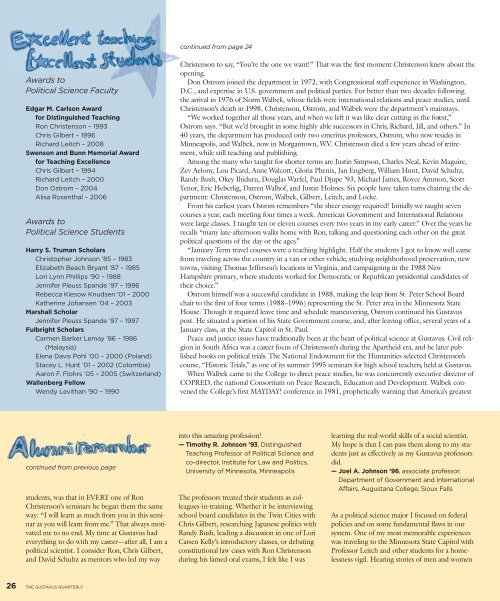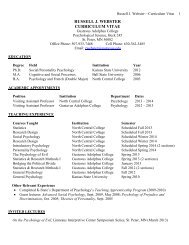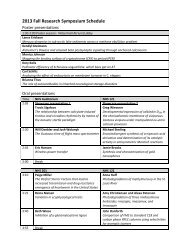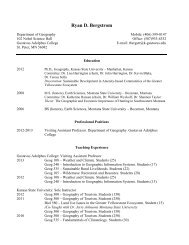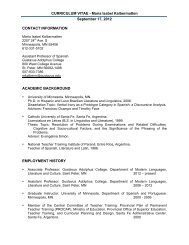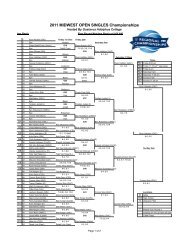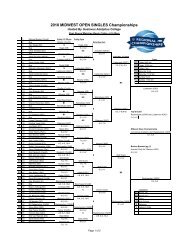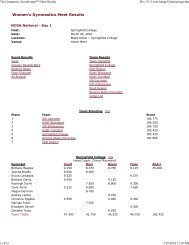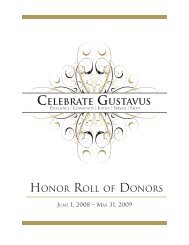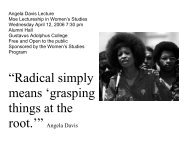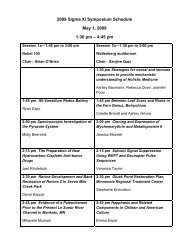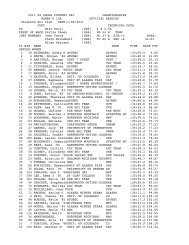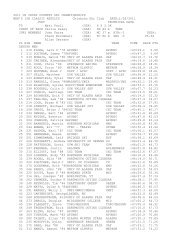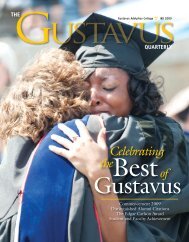Spring 2010 Gustavus Quarterly
Spring 2010 Gustavus Quarterly
Spring 2010 Gustavus Quarterly
You also want an ePaper? Increase the reach of your titles
YUMPU automatically turns print PDFs into web optimized ePapers that Google loves.
26<br />
Awards to<br />
Political Science Faculty<br />
Edgar M. Carlson Award<br />
for Distinguished Teaching<br />
Ron Christenson – 1993<br />
Chris Gilbert – 1996<br />
Richard Leitch – 2008<br />
Swenson and Bunn Memorial Award<br />
for Teaching Excellence<br />
Chris Gilbert – 1994<br />
Richard Leitch – 2000<br />
Don Ostrom – 2004<br />
Alisa Rosenthal – 2006<br />
Awards to<br />
Political Science Students<br />
Harry S. Truman Scholars<br />
Christopher Johnson ’85 – 1983<br />
Elizabeth Beach Bryant ’87 – 1985<br />
Lori Lynn Phillips ’90 – 1988<br />
Jennifer Pleuss Spande ’97 – 1996<br />
Rebecca Kiesow Knudsen ’01 – 2000<br />
Katherine Johansen ’04 – 2003<br />
Marshall Scholar<br />
Jennifer Pleuss Spande ’97 – 1997<br />
Fulbright Scholars<br />
Carmen Barker Lemay ’86 – 1986<br />
(Malaysia)<br />
Elena Davis Pohl ’00 – 2000 (Poland)<br />
Stacey L. Hunt ’01 – 2002 (Colombia)<br />
Aaron F. Flohrs ’05 – 2005 (Switzerland)<br />
Wallenberg Fellow<br />
Wendy Levithan ’90 – 1990<br />
continued from previous page<br />
students, was that in EVERY one of Ron<br />
Christenson’s seminars he began them the same<br />
way: “I will learn as much from you in this seminar<br />
as you will learn from me.” That always motivated<br />
me to no end. My time at <strong>Gustavus</strong> had<br />
everything to do with my career—after all, I am a<br />
political scientist. I consider Ron, Chris Gilbert,<br />
and David Schultz as mentors who led my way<br />
THE GUSTAVUS QUARTERLY<br />
continued from page 24<br />
Christenson to say, “You’re the one we want!” That was the first moment Christenson knew about the<br />
opening.<br />
Don Ostrom joined the department in 1972, with Congressional staff experience in Washington,<br />
D.C., and expertise in U.S. government and political parties. For better than two decades following<br />
the arrival in 1976 of Norm Walbek, whose fields were international relations and peace studies, until<br />
Christenson’s death in 1998, Christenson, Ostrom, and Walbek were the department’s mainstays.<br />
“We worked together all those years, and when we left it was like clear cutting in the forest,”<br />
Ostrom says. “But we’d brought in some highly able successors in Chris, Richard, Jill, and others.” In<br />
40 years, the department has produced only two emeritus professors, Ostrom, who now resides in<br />
Minneapolis, and Walbek, now in Morgantown, W.V. Christenson died a few years ahead of retirement,<br />
while still teaching and publishing.<br />
Among the many who taught for shorter terms are Justin Simpson, Charles Neal, Kevin Maguire,<br />
Zev Aelony, Lou Picard, Anne Walcott, Gloria Phenix, Jan Engberg, William Hunt, David Schultz,<br />
Randy Bush, Okey Ihiduru, Douglas Warfel, Paul Djupe ’93, Michael James, Royce Ammon, Scott<br />
Yenor, Eric Heberlig, Darren Walhof, and Justin Holmes. Six people have taken turns chairing the department:<br />
Christenson, Ostrom, Walbek, Gilbert, Leitch, and Locke.<br />
From his earliest years Ostrom remembers “the sheer energy required! Initially we taught seven<br />
courses a year, each meeting four times a week. American Government and International Relations<br />
were large classes. I taught ten or eleven courses every two years in my early career.” Over the years he<br />
recalls “many late-afternoon walks home with Ron, talking and questioning each other on the great<br />
political questions of the day or the ages.”<br />
“January Term travel courses were a teaching highlight. Half the students I got to know well came<br />
from traveling across the country in a van or other vehicle, studying neighborhood preservation, new<br />
towns, visiting Thomas Jefferson’s locations in Virginia, and campaigning in the 1988 New<br />
Hampshire primary, where students worked for Democratic or Republican presidential candidates of<br />
their choice.”<br />
Ostrom himself was a successful candidate in 1988, making the leap from St. Peter School Board<br />
chair to the first of four terms (1988–1996) representing the St. Peter area in the Minnesota State<br />
House. Though it required leave time and schedule maneuvering, Ostrom continued his <strong>Gustavus</strong><br />
post. He situated a portion of his State Government course, and, after leaving office, several years of a<br />
January class, at the State Capitol in St. Paul.<br />
Peace and justice issues have traditionally been at the heart of political science at <strong>Gustavus</strong>. Civil religion<br />
in South Africa was a career focus of Christenson’s during the Apartheid era, and he later published<br />
books on political trials. The National Endowment for the Humanities selected Christenson’s<br />
course, “Historic Trials,” as one of its summer 1995 seminars for high school teachers, held at <strong>Gustavus</strong>.<br />
When Walbek came to the College to direct peace studies, he was concurrently executive director of<br />
COPRED, the national Consortium on Peace Research, Education and Development. Walbek convened<br />
the College’s first MAYDAY! conference in 1981, prophetically warning that America’s greatest<br />
into this amazing profession!<br />
— Timothy R. Johnson ’93, Distinguished<br />
Teaching Professor of Political Science and<br />
co-director, Institute for Law and Politics,<br />
University of Minnesota, Minneapolis<br />
The professors treated their students as colleagues-in-training.<br />
Whether it be interviewing<br />
school board candidates in the Twin Cities with<br />
Chris Gilbert, researching Japanese politics with<br />
Randy Bush, leading a discussion in one of Lori<br />
Carsen Kelly’s introductory classes, or debating<br />
constitutional law cases with Ron Christenson<br />
during his famed oral exams, I felt like I was<br />
learning the real-world skills of a social scientist.<br />
My hope is that I can pass them along to my students<br />
just as effectively as my <strong>Gustavus</strong> professors<br />
did.<br />
— Joel A. Johnson ’96, associate professor,<br />
Department of Government and International<br />
Affairs, Augustana College, Sioux Falls<br />
As a political science major I focused on federal<br />
policies and on some fundamental flaws in our<br />
system. One of my most memorable experiences<br />
was traveling to the Minnesota State Capitol with<br />
Professor Leitch and other students for a homelessness<br />
vigil. Hearing stories of men and women


